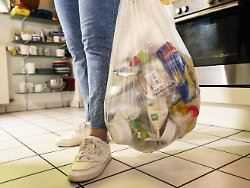Monday, February 15, 2021
Food for delivery is booming
Startups put an end to mountains of rubbish
If you don't want to do without the food from your favorite restaurant at home, you can have it delivered or get it. Because of this, there is a lot of packaging waste. To avoid metal and plastic waste, startups offer a simple solution. But restaurants have other concerns right now.
The food was delicious: homemade pasta from the Italian restaurant around the corner – eaten in the local kitchen, because the restaurant is closed. Food that has been picked up or delivered is booming in the corona pandemic and helping restaurants survive the crisis. But some customers feel guilty about clearing away the metal and plastic packaging waste after enjoying their meal.
Reusable systems such as those currently being rolled out by several German startups from Munich, Stuttgart and Cologne, among others, could help. The concepts of the systems are basically similar: They provide restaurateurs with reusable packaging. If the customer wants, they can have their food delivered in it instead of the usual one-way packaging. The bowl is then usually returned to any restaurant participating in the system.
Depending on the provider, the customer has to pay a deposit in advance or borrow the key using an app. Otherwise the process is free for him. The restaurateur bears the costs: Depending on the system, he pays either a monthly flat rate, only per loan or when purchasing and per loan process. That comes to 25 to 45 euros per month or 13.5 to 25 cents per use, depending on the provider. He saves part of it by eliminating the need for disposable packaging.
New costs do not trigger enthusiasm
At the Hotel and Restaurant Association Dehoga, enthusiasm for the offers is limited, which, in addition to Corona, is probably also related to the reusable obligation recently decided by the cabinet from 2023. "We are in a situation in which our industry is fighting for survival," said General Manager Ingrid Hartges at the time. New costs would not be accepted with enthusiasm. Regarding the reusable startups, the association says: "We are in contact with various providers. At the moment, however, we do not have any representative data from the industry."
At the Federation for Environment and Nature Conservation Germany, on the other hand, people are impressed by the initiatives. Such systems are a very good starting point, says the advisor for circular economy, Janine Korduan. And the startups made an important contribution "because they started with it". A central requirement is that the systems are easily accessible – otherwise they would not be accepted and would only end up in the corner. It is also important that the containers are often recyclable and that they are also returned. How many rounds to the customer and back a packaging can hold out, the information provided by the providers differ. But there are significantly more than 100 for all of them. And the return rates are also high – mostly close to 100 percent. "
Alternatives to styrofoam and plastic
"The corona pandemic is of course fueling the whole to-go and take-away business a lot. So the current situation also plays into our cards," says Matthias Potthast, co-founder of Relevo, a startup from Gröbenzell near Munich. There are currently 20,000 packages in circulation – at restaurants and student unions in Bavaria and Saarland.
The Stuttgart startup Recircle has been on the market for a long time and currently has 53,000 boxes. According to the company, this would save around 200,000 single-use packaging per month. Strong demand is reported for the Rebowl, which belongs to the Recup returnable cup system from Munich: "The restaurateurs are currently completely dependent on their take-away business, and we are also told that customers are specifically looking for a sustainable alternative to Styrofoam, plastic, etc. desire."
The startups are financed from their own resources or partly by investors. For example, a Swiss plastics manufacturer has joined Recircle, and the Cologne startup Vytal only closed a financing round a few days ago. The company collected more than two million euros. The money is now to be put into the expansion of the spending and return network, which includes restaurants, canteens and supermarkets. There is room for this: the number of participating companies per startup is currently only a few hundred.
.
